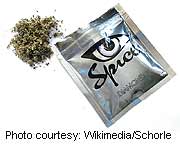
THURSDAY, Feb. 14 (HealthDay News) — Sixteen cases of serious kidney damage caused by synthetic marijuana products were reported in six states last year, according to a new U.S. government study released Thursday.
Although no one died, all 16 people had to be admitted to hospitals and five required hemodialysis, the report from the U.S. Centers for Disease Control and Prevention (CDC) said. In hemodialysis — a treatment commonly used to treat advanced kidney failure — a person’s blood is filtered to remove waste and extra fluids, and then the clean blood is returned to the body.
The patients described in the CDC report ranged in age from 15 to 33, all but one were male, and none of them had a history of kidney disease.
“Synthetic cannabinoids, which are sold in smoke shops and convenience stores under names like ‘synthetic marijuana,’ ‘Spice,’ ‘K2,’ or ‘herbal incense,’ are designer drugs dissolved in solvent, applied to plant material, and smoked,” the researchers explained. The report is published in the Feb. 15 issue of the CDC’s Morbidity and Mortality Weekly Report.
The government report followed on the heels on new research released last week that found that synthetic marijuana has been directly linked to serious kidney damage.
Those researchers, from the University of Alabama at Birmingham, pointed out that synthetic marijuana has become increasingly popular over the past few years because such man-made drugs are relatively cheap and difficult to detect with drug screening tests.
They also suggested that doctors should suspect the use of synthetic marijuana when patients, particularly young adults, have unexplained acute kidney damage.
“Cases of acute coronary syndrome associated with synthetic marijuana use have been reported, but our publication is the first to associate use with acute kidney injury,” study co-author Dr. Gaurav Jain, an assistant professor in the nephrology division, said in a university news release. Abnormally rapid heart rate and seizures have also been reported with synthetic marijuana use, he noted.
Jain’s team examined four cases of acute kidney damage that were linked to the use of synthetic marijuana. In each case, an otherwise healthy young man went to the emergency room with nausea, vomiting and abdominal pain after using the drug. All of the men, the researchers noted, lived in the same town in northeastern Alabama, and all of the cases occurred within a nine-week period.
Three of the men had an acute kidney injury that caused their volume of urine to be abnormally low. The fourth man had a drop in effective blood flow to the kidney. Three of the men had a kidney biopsy that showed the death of cells in the kidney that secrete, reabsorb, collect and transport urine. Although this condition can lead to kidney failure, in these cases the men regained their kidney function and did not need dialysis, the study authors noted in the news release.
Because all of the men had used synthetic marijuana, the doctors suggested that how the drug is manufactured may have played a role in its dangerous effects to the kidneys. They pointed out that synthetic marijuana is made with certain additives, which may be toxic to the kidneys.
However, the investigators could not confirm that the drug’s preparation causes kidney damage because they couldn’t analyze samples of the synthetic marijuana the men took or the men’s blood and urine samples, which were no longer available.
“There is very little information regarding the ingredients in synthetic cannabinoids that are sold on the streets, although it is known that additional compounds are added to the preparations,” said Jain. He suggested that it is “very likely” that a substance that is toxic to the kidney was added to the drug used by the patients.
The doctors concluded that patients with acute kidney injury should be asked about use of designer drugs, such as synthetic marijuana. “If they don’t get to a physician in time, the damage to their kidneys could be permanent, and they could end up on dialysis,” cautioned Jain.
The research was released online in advance of publication in the March print issue of the Clinical Journal of the American Society of Nephrology.
More information
The U.S. National Institute on Drug Abuse has more about synthetic marijuana.

